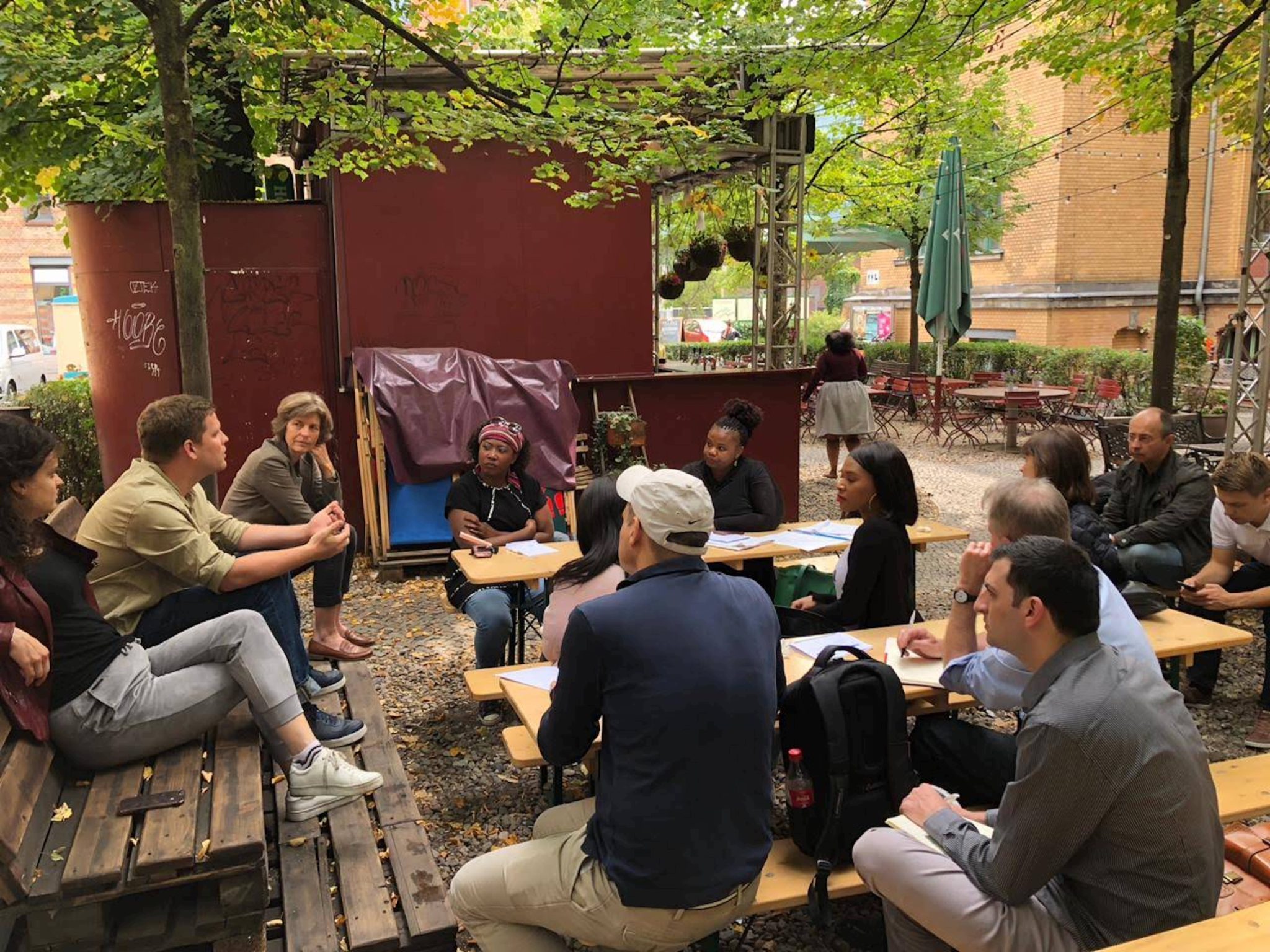Study Trip
How to Deal with Fake News in Today's Media

The study group in Berlin
© Friedrich-Naumann-Stiftung für die FreiheitFake news, click-bait, hate speech, censorship. These four concepts characterize the media debate in today’s world - they also played a central role when the Friedrich Naumann Foundation for Freedom invited a group of 11 journalists from South Africa to partake in a study trip on Media Dialogue. The participants were from diverse backgrounds, having collective experience in TV, print, radio and online media.
Among the participants was Gareth Cliff, founder of Africa’s number 1 podcasting medium CliffCentral, and a partner of the Friedrich Naumann Foundation for Freedom. Representing more traditional news, we had James Myburgh, who is the founder and editor of politicsweb, a leading South African website on domestic politics.
Ever since day one, the main topic of the group’s discussions seemed to be the dramatically changing media landscape, which affects the global media community on many different levels. Traditional newspapers are losing subscribers as people move to online platforms, a trend seen in both Germany and by our South African guests. In addition, traditional players on the market have problems getting readers to sign up for their paid online content, as the media consumers move toward unpaid content that many websites provide. This transition has brought challenges, but also opportunities, which was fondly emphasized by our guests from online media, such as CliffCentral.
These opportunities have also been seized by a number of innovative German media start-ups. During the week, the guests were invited to listen to presentations from three different German start-ups on how, why and for whom they work. First out was RiffReporter, a platform that allows independent journalists to niche themselves on a specific topic to create their own “coral” in the large reef that is RiffReporter. Second in line was Der Kontext, a start-up with a truly inspiring way to explain the background of complex topics through an interactive mind-map like design, where the user is shown how different aspects are connected and intertwined to one another. The guests were astonished with the user friendliness of the software, and discussions over possible alternative uses of the design were lively. Last but not least, the visitors got the opportunity to talk to Krautreporter, a German news cooperative that is financed entirely through membership fees. Another special feature of Krautreporter is the fact that they publish only one story per day, focusing solely on quality over quantity.
Qualitative, niched material seems to equal success for media start-ups in 2018, and it makes perfect sense. Unique, quality content gives the medium the option to charge for the content. In contrast, it seems unlikely that a small scale media start-up would manage against the fierce competition that is the broad, breaking news market today.
As before mentioned, there are both opportunities and challenges rising in today’s media landscape. One of the major challenges seen is fake news, which was heavily debated during the 2016 U.S. presidential election where Donald Trump was elected. This phenomena has however not only been found in the U.S., fake news is also prevalent in Germany, South Africa and other parts of the world. An expert on this topic, Alexander Sängerlaub project head at “Stiftung Neue Verantwortung” (roughly: Foundation for new responsibilities) provided the visitors with an introduction to the topic from his point of view. Sängerlaub discussed reasons why fake news flourishes in todays’ world, and how to recognize and avoid it, while also telling the visitors about the empirical studies that the foundation has carried through to provide facts on the matter.
One of the key aspects was to realize one’s own confirmation bias in searching for news. Briefly explained, the confirmation bias leads to situations where one tends to believe in news that confirms one’s previous believes. Because the internet is flooded with information from several sources (that oftentimes contradict each other), it is very easy to find a source that confirms one’s (possibly false) believes. Add in algorithms that show results that fit the individual’s previous searches and thoughts to the mix and one will find a perfect environment for “fake news” to grow viral. It is human nature to want confirmation for own beliefs, and thus it spreads.
So how should society deal with fake news in todays’ media landscape? Unsurprisingly, the group did not find a “quick-fix” for it. In the long term, the group unanimously agreed that critical thinking in the digital age needs to be taught in school, so that new generations learn to be critical in their media consumption. Being critical of stories that confirm one’s already existing personal beliefs is especially important, and needs to be emphasized in education.
